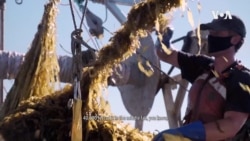((PKG)) KELP FARMING IN MAINE
((TRT: 5:05))
((Topic Banner: Kelp Farming in Maine))
((Director/Camera: Aaron Fedor))
((Producer: Kathleen McLaughlin))
((Editor: Kyle Dubiel))
((Map: Portland, Maine))
((Main characters: 1 male; 2 female))
((BLURB: Fishermen diversify their income by farming kelp in their off season.))
((NATS))
((Briana Warner
President/CEO, Atlantic Sea Farms))
We're looking at a pretty significant economic development issue here on the coast of Maine as the Gulf of Maine warms faster than 98% of oceans in the world. We're working with fishermen to diversify their income by farming kelp in their off-season.
((NATS))
((Matt Moretti
Co-Owner/CEO, Bang Island Mussels))
The working waterfront in Maine is traditionally very independent. Most of the people that I can think of are all, you know, owner operators or own independent boats, and I'm mostly thinking about lobstermen here. The ASF [Atlantic Sea Farms] model allows people to maintain their independent owner operator status, but also get the support that they need to venture into a new field that's totally different from wild capture.
((NATS))
((Matt Moretti
Co-Owner/CEO, Bang Island Mussels))
I started out farming mussels in 2010 and very soon after that, we decided to add kelp to the mix. The main reason was that it was a chance to do even more positive environmental good. Kelp is grown in the winter. It's a very fast-growing organism. So, we plant all of our kelp, 40,000 feet of it in the middle fall, you know, sometime October, November. We grow it over the winter exclusively. We maintain it during that period and then we harvest it all in the early spring.
((MUSIC/NATS))
((Briana Warner
President/CEO, Atlantic Sea Farms))
We help fishermen get their leases. We help our partner farmers seek their spots, set up their farms. We provide technical assistance on how to grow kelp. We have an overarching kelp transfer kind of program, and then we also grow all of the seeds for the kelps, and we give those seeds to our partner farmers for free. So, if there is some sort of problem on their farm, if they do see some sort of, you know, disruption from storms or the lines break, they're not out money. They're only out the time they spent seeding out that farm. After this, the growing season is over. We work with them to harvest, to give them harvest bags. We do all the transport. We do all the logistics and they basically land it on the dock. We weigh it on the dock and it goes away and it comes back to this facility, which is 27,000 square feet [2508 sq. meters], where we turn it into a value-added product.
((MUSIC/NATS))
((Matt Moretti
Co-Owner/CEO, Bang Island Mussels))
Kelp is good for the environment because it helps remove some of the excess nutrients that are in coastal ecosystems. Often those nutrients are caused by human reasons, human sources. So, kelp actually absorbs those nutrients from the water, which can help balance ecosystem, make a healthier coastal ecosystem.
((NATS))
((Jesse Baines
Chief Marketing Officer, Atlantic Sea Farms))
My father's a fisherman, primarily lobster. I have uncles, cousins. My brother grew up fishing, and still today lobster is king in Maine. But we have a very vibrant, sustainable, beautiful fishery filled with really hardworking, dedicated people.
((NATS))
((Jesse Baines
Chief Marketing Officer, Atlantic Sea Farms))
Growing up, sustainability was always kind of at the forefront of our conversations around lobstering. And that's why we knew we wanted to work with leaders in the industry because chances are, if you're a really good lobster fisherman, you're going to be a really good kelp farmer.
((MUSIC/NATS))
((Jesse Baines
Chief Marketing Officer, Atlantic Sea Farms))
We had a few people who came to the forefront as leaders. And one of those people was Keith Miller, who’s like, "I'll give it a try, guys." But sure enough, that first season, what Keith saw was a beautiful crop and he saw us come to the dock and pick it up and hand him a check. Keith held up that check to the community of people who were around him, wondering what the hell he was doing out there and said, "Look boys, this here’s the future." He and our other partner farmers, especially the ones who came on early, they're innovating every year. They're problem-solving with us. They're figuring out new ways to lay out moorings and lines and seeding lines and all of these different things that are really key to developing this industry.
((MUSIC/NATS))
((Briana Warner
President/CEO, Atlantic Sea Farms))
I think what I get most excited about with my job is I get to really challenge conventional wisdom about what a food system can be and what food can do for people and the environment. So, to be able to look at the coast and see the exact same issues that we're confronting everywhere else, just maybe 20 years early, so that we can actually do something about it, is pretty exciting. And so, we can also be, not only like a warning sign for the rest of the world, but also a beacon of hope for how we can go about climate change adaptation in a way that is thoughtful and preemptive.
((MUSIC/NATS))
Kelp Farming in Maine
Episodes
-
![Alpaca Farmer]() September 29, 2023
September 29, 2023Alpaca Farmer
-
![Nature | Botanic Garden]() September 29, 2023
September 29, 2023Nature | Botanic Garden
-
![Nature | Fishing for Salmon]() September 22, 2023
September 22, 2023Nature | Fishing for Salmon
-
![North Carolina Shipwrecks]() February 03, 2023
February 03, 2023North Carolina Shipwrecks
-
![Harvesting Birch Sap]() January 27, 2023
January 27, 2023Harvesting Birch Sap
-
![Urban Agriculture]() January 27, 2023
January 27, 2023Urban Agriculture











